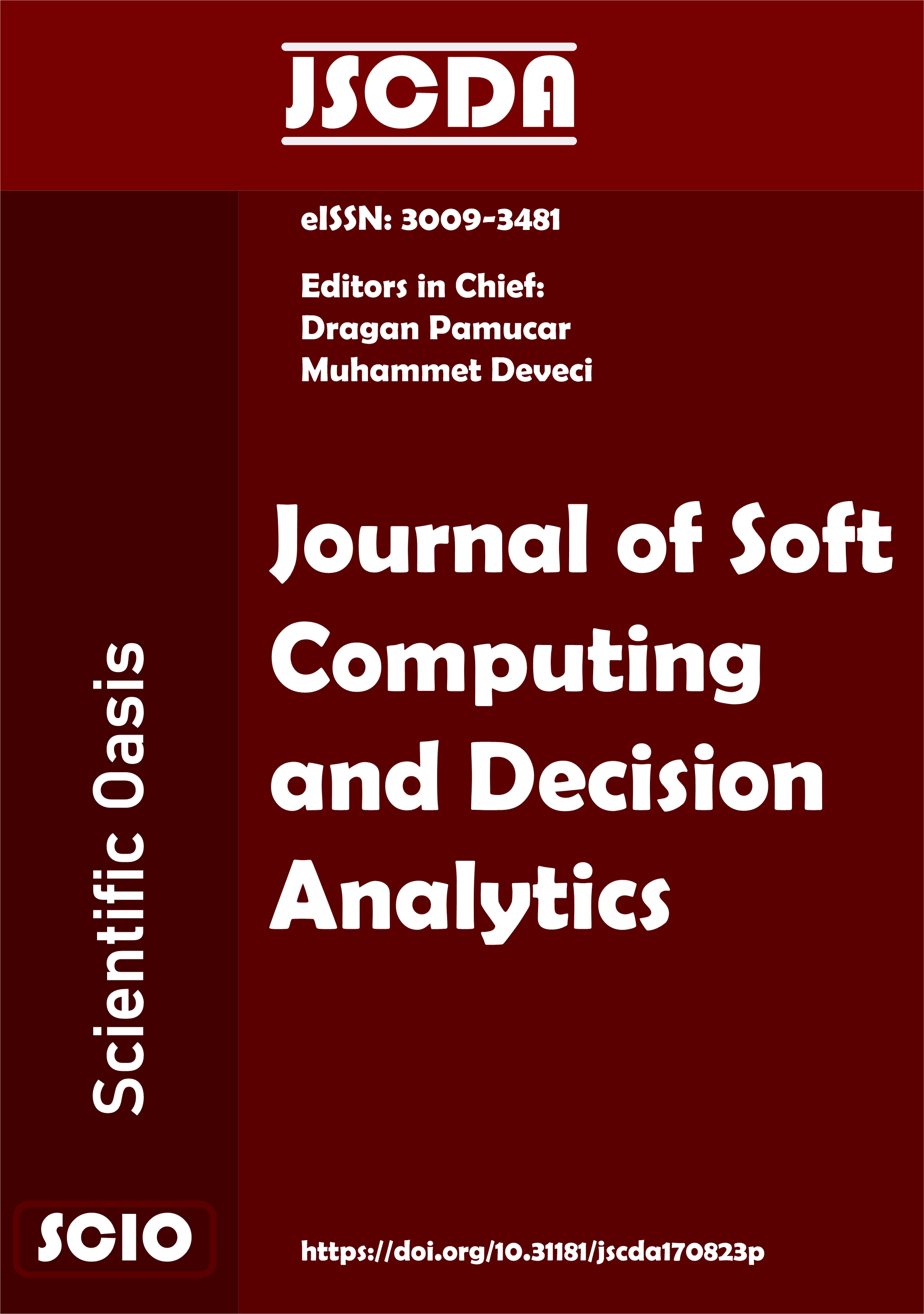A novel multiple criteria ranking approach for determining the Most Valuable Player (MVP) of a sport season: A numerical study from NBA league
DOI:
https://doi.org/10.31181/jscda11202323Keywords:
Sport management, multiple criteria, uncertainty, decision analytics, ranking, axiomatic design, FUCOMAbstract
Team sports have gained a significant place in society, generating debates about team strengths, player merits, and ultimately, determining champions. The National Basketball Association (NBA) offers various individual awards, with the MVP award holding paramount importance. Selecting the MVP necessitates a comprehensive approach considering both statistical performance and team success throughout the season. This study presents a fuzzy decision-making approach to compare the performance of players and identify the MVP of the League. A case study for the 2022-2023 NBA season is presented in this study, wherein 535 players' regular season statistics are analyzed. Correlation analysis is employed to eliminate the criteria which are dependent on each other. Therefore, the number of criteria has been decreased from twenty to seven which are defined as key metrics: (i) matches won, (ii) points scored per game, (iii) shooting percentage, (iv) rebounds per game, (v) assists per game, (vi) steals per game, and (vii) blocks per game. After correlation analysis, Full Consistency Method (FUCOM) is employed to determine the importance weights of the criteria. We have employed a specific normalization procedure and employed information axiomatic design (IAD) to rank players based on their total information contents. The case study proves the feasibility and applicability of the proposed methodology for multiple criteria ranking problem. Future research may focus on position-specific rankings, providing more accurate assessments, and extending analysis to youth leagues for draft day decisions.
Downloads
References
Ballı, S., Karasulu, B., Uğur, A., & Korukoğlu, S. (2009). Basketbolda oyuncu seçimi için sinirsel-bulanık karar destek sistemi. itüdergisi/d. http://www.itudergi.itu.edu.tr/index.php/itudergisi_d/article/view/89/77
Çetin, B., & Eren, T. (2016). TÜRKİYE ERKEK MİLLİ BASKETBOL TAKIMINA EUROBASKET 2015 İÇİN OYUN KURUCU SEÇİMİ. Kafkas Üniversitesi İktisadi ve İdari Bilimler Fakültesi Dergisi. https://doi.org/10.9775/kauiibfd.2016.011
Chen, M. (2017). Predict NBA Regular Season MVP Winner. In IEOM South American Conference Proceedings, 44-51. http://ieomsociety.org/bogota2017/papers/9.pdf
Chen, Y., Gong, Y., & Li, X. (2017). Evaluating NBA player performance using bounded integer data envelopment analysis. INFOR: Information Systems and Operational Research, 55(1), 38-51. https://doi.org/10.1080/03155986.2016.1262581
Ciğerci, A. (2020). Euroleague Dörtlü Final Oynayan Takımlardaki Yerli ve Yabancı Oyuncuların Karşılaştırılması. Journal of Physical Education and Sport Sciences. https://dergipark.org.tr/tr/download/article-file/1197702
Coleman, B. J., DuMond, J. M., & Lynch, A. K. (2008). An examination of NBA MVP voting behavior: does race matter?. Journal of Sports Economics, 9(6), 606-627. https://doi.org/10.1177/1527002508320653
Cooper, W. W., Ruiz, J. L., & Sirvent, I. (2009). Selecting non-zero weights to evaluate effectiveness of basketball players with DEA. European Journal of Operational Research. https://doi.org/10.1016/j.ejor.2008.02.012
Fan, L. X., Cai, M. Y., Lin, Y., & Zhang, W. J. (2015). Axiomatic design theory: Further notes and its guideline to applications. International Journal of Materials and Product Technology, 51(4), 359-374. https://doi.org/10.1504/IJMPT.2015.072557
Hubáček, O., Šourek, G., & Železný, F. (2019). Exploiting sports-betting market using machine learning. International Journal of Forecasting. https://doi.org/10.1016/j.ijforecast.2019.01.001
Ilieva, G. (2020). Fuzzy group full consistency method for weight determination. Cybernetics and Information Technologies, 20(2), 50-58. https://doi.org/10.2478/cait-2020-0015
Kahraman, C., & Çebı, S. (2009). A new multi-attribute decision making method: Hierarchical fuzzy axiomatic design. Expert Systems with Applications, 36(3), 4848-4861. https://doi.org/10.1016/j.eswa.2008.05.041
Kizielewicz, B., & Dobryakova, L. (2020). MCDA based approach to sports players’ evaluation under incomplete knowledge. Procedia Computer Science, 176, 3524-3535. https://doi.org/10.1016/j.procs.2020.09.034
Kulak, O., Cebi, S., & Kahraman, C. (2010). Applications of axiomatic design principles: A literature review. Expert systems with applications, 37(9), 6705-6717. https://doi.org/10.1016/j.eswa.2010.03.061
Mertz, J., Hoover, L. D., Burke, J. M., Bellar, D., Jones, M. L., Leitzelar, B., & Judge, W. L. (2016). Ranking the greatest NBA players: A sport metrics analysis. International Journal of Performance Analysis in Sport, 16(3), 737-759. https://doi.org/10.1080/24748668.2016.11868925
Palabıyık, H., Bayındır, S., & Uygun, Ö. (2020). Üniversite tercihinin bulanık aksiyomatik tasarım. Balıkesir Üniversitesi Fen Bilimleri Enstitüsü Dergisi, 22(1), 20-33. https://doi:10.25092/baunfbed.673466
Pamučar, D., Stević, Ž., & Sremac, S. (2018). A new model for determining weight coefficients of criteria in mcdm models: Full consistency method (fucom). Symmetry, 10(9), 393. https://doi.org/10.3390/sym10090393
Sarlis, V., & Tjortjis, C. (2020). Sports analytics—Evaluation of basketball players and team performance. Information Systems, 93, 101562. https://doi.org/10.1016/j.is.2020.101562
Suh, N. P. (2001). Axiomatic design: advances and applications. New York: Oxford University Press.
Watanabe, R., Ishibashi, H., & Furukawa, T. (2022). Visual analytics of set data for knowledge discovery and member selection support. Decision Support Systems. https://doi.org/10.1016/j.dss.2021.113635
Yongjun, L., Lizheng, W., & Feng, L. (2021). A data-driven prediction approach for sports team performance and its application to National Basketball Association. Omega. https://doi.org/10.1016/j.omega.2019.102123
Downloads
Published
Issue
Section
License
Copyright (c) 2023 CC Attribution-NonCommercial-NoDerivatives 4.0

This work is licensed under a Creative Commons Attribution-NonCommercial-NoDerivatives 4.0 International License.
















